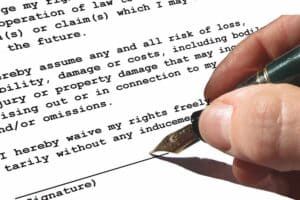The Social Host Waiver – Will It Protect You?
For many years – hundreds, perhaps – it’s been clear that some people will drink and act irresponsibly no matter what. The depressing number of alcohol-related crashes on our roads is proof of that.

Social host laws were invented to protect those people and everyone else. A social host law holds you responsible if your guests drink too much at a gathering and then cause harm to themselves or others.
If there’s one reason that social host laws were invented, it’s drunk driving. Since some people refuse to shoulder the responsibility of driving sober, a law was needed to shift that responsibility onto someone else. That someone is the host. You are more likely to take a drunken guests’s car keys away if you will be held responsible for the consequences.
End of story? Hardly. We now have the social host waiver. In some areas of the country you will find hosts who have taken to asking guests to sign waivers, absolving hosts of responsibility for any harm that might come of their drinking. They feel it’s easier and safer than policing their fun-loving guests all night.
Do the waivers work? According to attorneys, they can. If a guest trips and falls after getting drunk at your house, the waiver might protect you. Even if your guest decides to get behind the wheel and drive home drunk, the waiver might keep you from getting sued if your guest sustains an injury or damages property.
But here’s the catch. If your guest injures a third party, don’t expect the waiver to work its magic. The innocent third party, remember, did not sign it. You will still be liable.
So a waiver is not sufficient protection against a guest who drinks and drives. Rather than attempting to dodge legal liability, do some party planning :
If you’re the host, stay sober
- Line up designated drivers
- Serve non-alcoholic beverages along with the alcohol, so guests can switch
- Serve food with alcohol
- Stop serving alcohol an hour before the party ends
And most important:
- If your guest shouldn’t be driving, take the keys away
It’s not just a legal question — it’s good sense, and you’ll sleep better.
